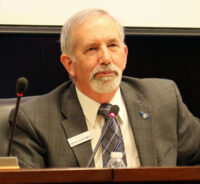Late Thursday afternoon, Idaho’s literacy initiative appeared to be in trouble — again.
A skeptical Senate Education Committee asked pointed questions about House Bill 526, the backbone for Gov. Butch Otter’s literacy plan. The committee didn’t vote — and because senators had to head to the floor for a late afternoon floor session, they put the bill on hold.
On Tuesday, the same committee was on a similar deadline, with less than an hour to consider this key piece of the literacy bill. But this time, the mood in the room and the tone of the committee could hardly be more different. Skepticism gave way to enthusiasm.

“I’m excited that this bill is here,” Senate Education Chairman Dean Mortimer said, moments before the committee unanimously endorsed HB 526.
In a sense, HB 526 represents the policy piece of the literacy initiative — an attempt to provide extra help to 36,000 kindergartners through third-graders who are not reading at grade level.
It would be up to local districts to decide how to provide the help, but HB 526 sets the parameters. They would have to offer at least 60 hours of intervention to students who score “below basic,” the lowest score on the Idaho Reading Indicator. They would have to provide at least 30 hours of help to students scoring “basic” on the IRI — which is still below grade level.
That extra help could take any number of forms. For example, districts could follow the lead of the Kuna School District, and provide all-day kindergarten for struggling readers. On Tuesday, Eileen O’Shea told senators that the first year of Kuna’s all-day kindergarten was a big success; by year’s end, all but one kindergartner scored at grade level on the IRI.
But the literacy bill — with its foundation in local control — has run into turbulence in both the House and the Senate.
House Education Committee members considered the first literacy bill too vague, so they put it through a rewrite. The result was HB 526, which sailed through the House on a 62-2 vote.

But when that bill hit Senate Education, it ran into a new crop of questions. Senators worried because the state was already spending $2.4 million a year on literacy intervention — to no great effect. Sen. Steven Thayn, R-Emmett, suggested the bill would create a disincentive of sorts, since districts would actually receive more money based on how many of their students struggled with reading.
But somewhere between Thursday and Tuesday, committee members had a collective change of heart. The prevailing sentiment was that it was time to do something — knowing the Legislature could come back next year and fine-tune the literacy plan.
“We need to definitely try to move this needle,” said Sen. Bob Nonini, R-Coeur d’Alene.
That doesn’t mean senators passed the bill without reservations. Thayn is worried about distributing millions of dollars based on IRI scores. Nonini is worried about whether the Legislature will back up HB 526 with adequate funding.
And after Tuesday’s committee meeting, funding may be the biggest question surrounding the literacy initiative.
It’s still up to the budget-writing Joint Finance-Appropriations Committee to write a spending bill to support the literacy plan. Otter has requested $10.7 million — which translates to about $290 for every child who is not reading at grade level. (The current literacy plan provides about $100 for interventions, but only for the 16,000 students who score below basic on the IRI.)
Even if the Senate follows the Education Committee’s lead and passes HB 526 overwhelmingly, funding remains a work in progress.
But on Tuesday, the literacy policy bill might well have cleared its last big hurdle.
